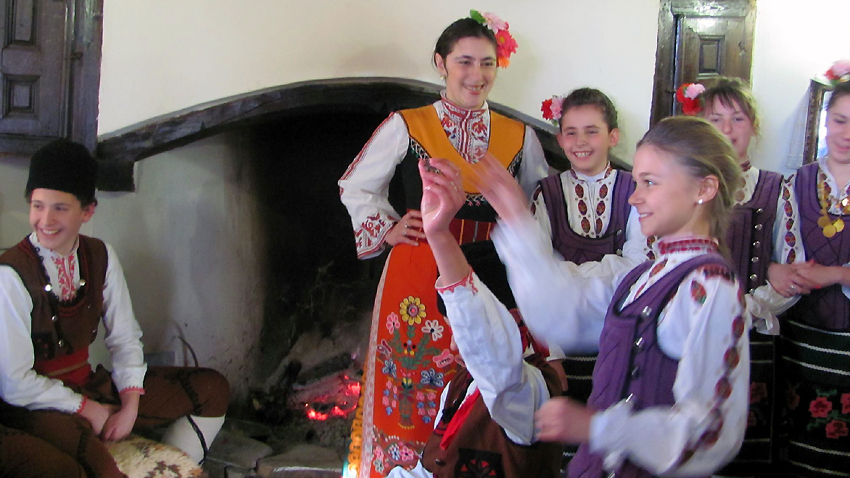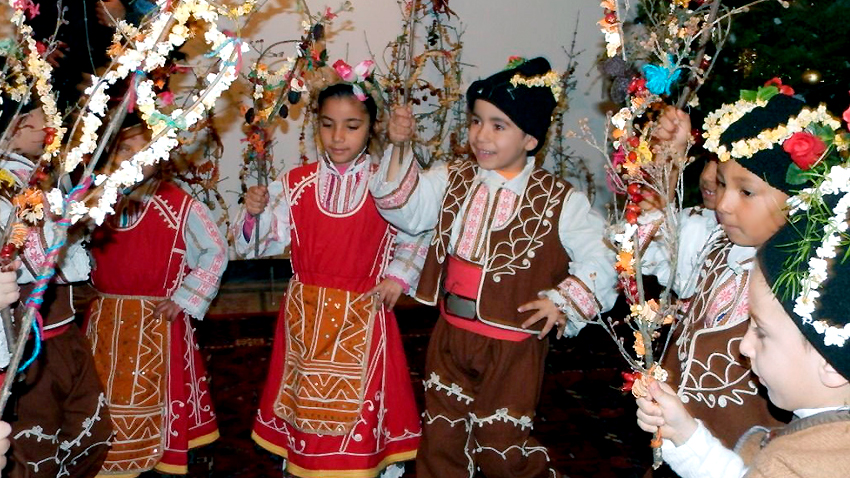For centuries the coming of the New Year has been one of the most important moments in Bulgarian tradition. It is more than a change of digits on the calendar, it is a borderline that has to be crossed, and it is crossed with a series of rituals and customs.
They begin in the first days of December and continue throughout January – a time regarded as a transition from darkness to light, from chaos to a new order.
On 31 December is the last dinner that is thurified. But unlike Ignazhden (the day of St. Ignatius) and Christmas Eve when the meal did not include meat, the meal on New Year’s Eve had to include pig’s head or pork jelly. This is the only instance when pork is used as ritual food. There are parts of the country still, usually in the rural regions, where people still keep livestock and that is where this custom is observed to this day. Otherwise, the food put on the table is, to a great extent, the same as on Christmas Eve – wheat, fruit and vegetables, walnuts, peppers and cabbage rolls stuffed with meat… It is said that the more food there is on the table, the more bountiful the coming year will be. The banitsa with fortune slips, made during the old year, is cut up into pieces in the first hours of the new year. In olden times the women of the house would snap off cornel twigs to use as fortune tokens – one for each member of the household. And each one would have a different meaning – health, love, marriage etc…
The day of St. Basil, called Vassilyovden, falls on 1 January, and as any time of transition in the folklore calendar, it is a day to have one’s fortunes told. Laduvane is one of the rituals performed on this day with divinations – young lasses would find out whether they would get married the coming year, and to whom. Rings would be tied to posies and would be dropped into a receptacle full of “silent water” for the night. In the morning, the girls would fish the posies out to short ritual incantations describing different crafts and occupations. For example: White paper, black ink meant the future husband would be a teacher; Gold bracelets clanging on the bed meant he would be a goldsmith etc. Interestingly, this is a ritual that has been preserved and is performed in many villages in our day, though of course, now it is just part of the festivities on this day and a way to show commitment to ancient tradition.

There is one ritual that is, perhaps, the most enduring ritual at this time of year, and it is survakane, a practice that has never ceased to exist. For this ritual a survachka is used – intertwined cornel twigs, a symbol of health and endurance. Nowadays, there are ready-made survachkas, though in olden times they were hand-made. The twigs were then decorated – with woolen threads of different colours, though red is a must, a red apple, popcorn and dried fruit. Unlike the koledari, who are young men, the survakari are boys aged 4 to 14. In villages and small towns where everyone knows everyone else, groups of survakari make the rounds of many of the houses on New Year’s night. But more often than not, the children go to relatives, friends and neighbours to tap them on the back with their survachkas, for which they are given money, fruit etc. Depending on the region, the incantations that accompany this ritual are different, but the meaning of this practice is the same – it is done for health and prosperity.

English version: Milena Daynova
The Youth Centre "Zahari Stoyanov" in the town of Dobrich, Northeastern Bulgaria, is organizing a folklore meeting of communities on the occasion of the International Day of Tolerance. The aim of the event, which will take place from today to 17..
The Bulgarian folklore dance group Vito Horo from Perth will take part in the multicultural women’s festival Harmony of Colours, taking place tonight in the Australian city, the Bulgarian association Rodina has announced. Besides the Bulgarian..
The resort towns along Bulgaria’s Black Sea coast can be broadly categorized into two types: modern ones, characterized by their lively and colorful streets, and port cities with a rich history. Various settlers have passed through these port towns,..

+359 2 9336 661
